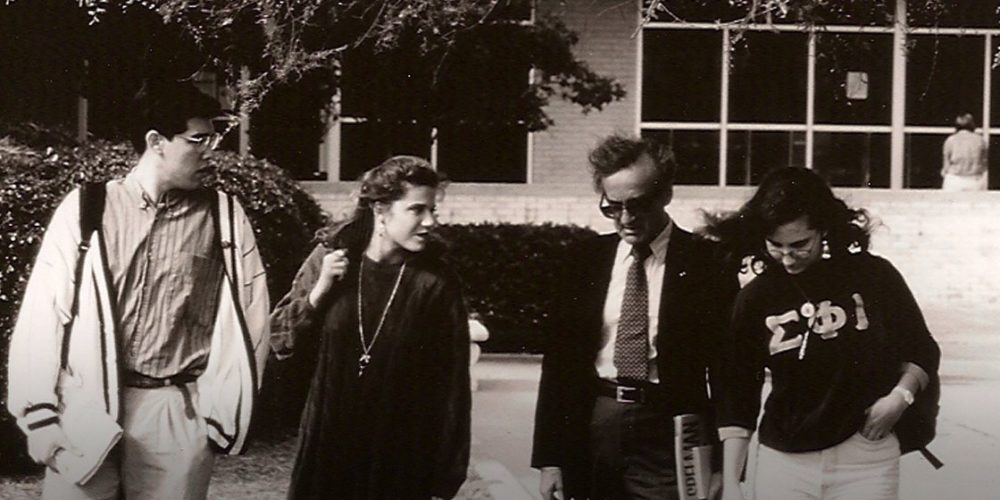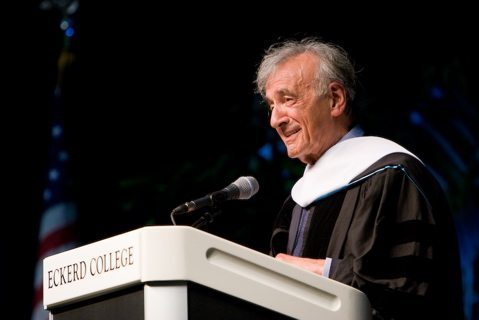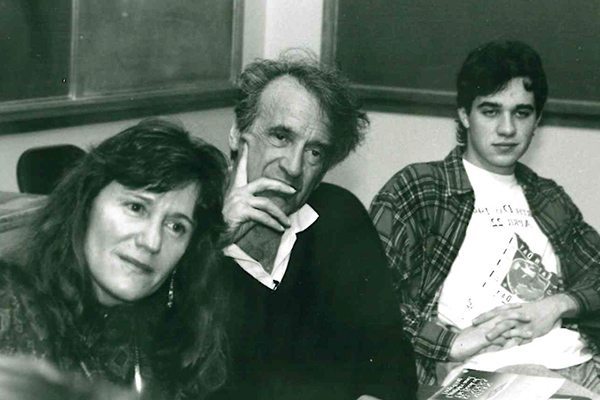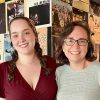
Students chat with Elie Wiesel on a walk across campus in the 1990s; Wiesel taught at Eckerd for 23 years.
Welcome back to St. Petersburg, Professor Wiesel! The work of the late Nobel Laureate, esteemed writer, political activist and Holocaust survivor Elie Wiesel is headed to its new home at the Florida Holocaust Museum after the museum won a competitive grant spearheaded by an Eckerd College graduate.
The FHM will receive a massive collection of Wiesel’s items—including his Nobel Peace Prize, manuscripts, letters, artworks, and the entirety of his office and library. This treasure trove of artifacts will become part of a permanent exhibition at the museum, creating opportunities for the study of his renowned work as well as making a significant cultural impact on the community at large.
This collection is “probably the single most inclusive collection on the Holocaust that is available this side of the pond,” says Grace Anne Alfiero ’04, who headed up the team that wrote the proposal for the collection in 2022. Alfiero graduated from Eckerd with a degree in visual arts as a part of the Program for Experienced Learners and now works as a consultant for nonprofit organizations like the Florida Holocaust Museum. To complete the proposal, she used letters of support from Professor of Literature and Comparative Literature Jared Stark, Ph.D., and Professor of American Studies and History and Elie Wiesel Professor of Humane Letters Carolyn Johnston, Ph.D.
“In learning about Wiesel, visitors are also going to learn about someone who was, in some ways, a very ordinary, accessible, approachable person who was able to use his voice to awaken the consciousness of the world,” Stark says.
He worked with Wiesel during the two decades the writer taught at Eckerd. Stark is particularly excited for the collection to come to St. Petersburg because of Eckerd’s connection to the Nobel Laureate and the opportunities for outreach and study.
Stark has taught many classes focusing on Holocaust research and says he hopes to include the collection in his courses when it becomes available to the public. “Wiesel himself is a figure who is absolutely crucial for thinking about the Holocaust memory and testimony and Holocaust history,” Stark says. “His writing played a key role in giving survivors a kind of global prominence.”
From 1993 to 2016, Wiesel led Winter Term courses with Johnston during the month of January, teaching classes like “Remembering and Forgetting: Personal and Political Transformation” and “The Witness: Literature of Memory.” He was beloved by all who took his classes, Johnston says. “I can’t describe how profound his impact was … [and] the power of the love he radiated.”
After Wiesel’s death in July of 2016, she contacted over 75 of his previous students, colleagues and friends to compile a massive collection of testimonials to his legacy, including memorials from Eckerd College then-President Donald R. Eastman III and Campus Rabbi Ed Rosenthal.
Johnston is “thrilled” about the FHM’s acquisition of the collection, not only for its scholarly applications but also as a way to immortalize his legacy. “We must do everything we possibly can to preserve his legacy because we need him … probably more than we’ve ever needed him before.”

Elie Wiesel at the Eckerd College 50th Anniversary Convocation, February 2008

Johnston (left) with Wiesel in a classroom












